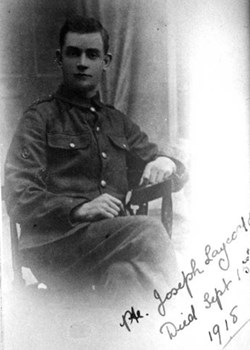15 September 1918: Joseph Laycock
- Home
- On This Day
- 15 September 1918: Joseph Laycock

Joseph Laycock died of disease in Mesopotamia on this day in 1918
Joseph Laycock was born in Batley on 18th September 1894 and as a boy attended the Wesleyan Sunday School. He volunteered aged 19 in August 1914, leaving his job at G. & J. Stubleys in Batley, joining the K.O.Y.L.I. and being posted to the 6th Battalion. Joe arrived in France in May 1915 with his battalion as part of the 14th (Light) Division. He was seriously wounded at Hooge, near Ypres, in early August 1915; one of his letters describes the German’s use of liquid fire, which was used by the Germans at Hooge on 30th July 1915.
After recovering from his wounds in England, Joseph was more than likely reclassified as being not fit for active service in France, he was probably however passed fit for garrison duty overseas, and was therefore sent to India in September 1916, probably as part of the 1st (Garrison) Battalion East Yorkshire Regiment. In September 1917 Joseph was sent to Mesopotamia, joining the 2nd (Garrison) Battalion, Northumberland Fusiliers.
In mid-September 1918, his parents, Richard and Elizabeth Laycock received a letter from Joseph at their home in Eastfield Road, Northorpe, saying that he had never been in better health. Shortly after writing this he fell ill whilst in Baghdad and was, according to the Dewsbury Reporter, transferred to Basra where he died on 15th September 1918.
It is not clear, however, if he was actually transferred to Basra as the Commonwealth War Graves Commission’s records show him being buried in Baghdad (North Gate) War Cemetery. It is possible that he was due to be transferred to Basra, but died before starting the journey. The cemetery contains nearly 6,000 burials, and thanks to Hussam Saad and the War Graves Photographic Project we have a photograph of his headstone (below).


Above and below: Baghdad (North Gate) courtesy of Virtual War Memorial vwma.org.au






